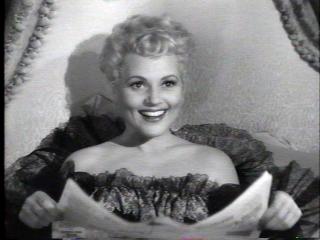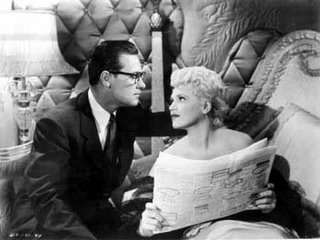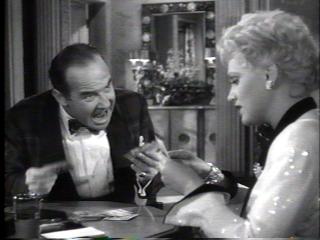
Born Yesterday (1950)
Director: George Cukor
According to Glenn McMahon from the website The Judy Holliday Resource Center (http://www.wtv-zone.com/lumina/judy/main.html), "50 years after Born Yesterday was released, it was named the 24th greatest comedy in cinema history by the American Film Institute, and today is considered by many to be a national treasure." The fact that its star, Judy Holliday, beat out such powerhouse actresses as Gloria Swanson (Sunset Boulevard), Bette Davis (All About Eve), and Anne Baxter (All About Eve) to win the Best Actress Oscar for her performance may account for the high esteem in which this film is held. While Holliday's screen version of Emma "Billie" Dawn, the character she created as the star of Garson Kanin's Broadway hit Born Yesterday, is as good as the gold Oscar it won, this movie is a fairly unpleasant affair.
The film's title refers to the rebirth of dumb blonde Billie's mind. Billie, a former chorus girl, has been the kept woman (a "fiancee" for seven year) of loutish scrap metal magnate Harry Brock (Broderick Crawford). In the opening scene, we watch as Brock barks demands at the staff of a luxurious Washington, DC, hotel with the flashy-dressing Billie slinking at his side, piling fur coat upon fur coat into the bellboy's arms and gazing contemptuously at all within her eyeshot. The first time we hear her speak, it is to answer Brock's ear-splitting bellow from another room with a shout that puts Eliza Doolittle's "EOWWW!" to shame.
Brock is in town to bribe some legislators and wants Billie to be presentable to this corrupt, but cultured, group of politicos. Earlier, he allowed an influential reporter named Paul Verrall (William Holden) to interview him on the advice of his crooked lawyer (Howard St. John). Recognizing Verrall as a well-spoken individual, Brock hires him to teach Billie to speak pro
 perly and carry on polite conversation. Verrall takes the opportunity to "corrupt" Billie's blank mind with a thirst for knowledge and a love of country. He means to have her help him get the goods on Brock, but immediately telegraphs his attraction to her. Billie, a very straightforward gal, tells him "I go for you, too." Thus, the final clinch seems a foregone conclusion. In between, we are treated to visits to the Jefferson Memorial and the National Gallery and watch as Billie takes to reading the newspapers and Thomas Paine, her trusty dictionary close at hand. When the final showdown with Brock occurs, love conquers corruption, and money is rejected in favor of happiness. The end.
perly and carry on polite conversation. Verrall takes the opportunity to "corrupt" Billie's blank mind with a thirst for knowledge and a love of country. He means to have her help him get the goods on Brock, but immediately telegraphs his attraction to her. Billie, a very straightforward gal, tells him "I go for you, too." Thus, the final clinch seems a foregone conclusion. In between, we are treated to visits to the Jefferson Memorial and the National Gallery and watch as Billie takes to reading the newspapers and Thomas Paine, her trusty dictionary close at hand. When the final showdown with Brock occurs, love conquers corruption, and money is rejected in favor of happiness. The end.There were plenty of comic possibilities in this screenplay ghostwritten by Kanin (his feud with Columbia president Harry Cohn kept his involvement strictly unofficial), but Cukor and his
 players blow almost all of them. Broderick Crawford does little but shout. He completely lacks the delicate touch that would have turned scenes such as the gin rummy game between Billie and Brock into laugh riots. Holliday valiantly keeps setting up the jokes, even when Crawford and the too-serious-by-half Holden keep dropping them to the rug. Finally, Cukor seems to give up. He lets Holliday play to herself, rolling her eyes delightedly every time she says something right with such determination that we can't possibly look at how dead everyone around her is. A more serious scene with Holden during which Billie laments her strained relationship with her father is directed with a heavy hand and further drags the film's tone down.
players blow almost all of them. Broderick Crawford does little but shout. He completely lacks the delicate touch that would have turned scenes such as the gin rummy game between Billie and Brock into laugh riots. Holliday valiantly keeps setting up the jokes, even when Crawford and the too-serious-by-half Holden keep dropping them to the rug. Finally, Cukor seems to give up. He lets Holliday play to herself, rolling her eyes delightedly every time she says something right with such determination that we can't possibly look at how dead everyone around her is. A more serious scene with Holden during which Billie laments her strained relationship with her father is directed with a heavy hand and further drags the film's tone down.Still in all, Holliday is such a fresh-faced, delightful star (she gives Shirley Temple's dimples a run for their money) that I found a way to hack through the dead wood and enjoy watching her do her thing. She may have seemed an odd match for William Holden's highly literate liberal, but it's easy to see why anyone would fall for her. Holliday may have made a trademark of the dumb, but sincere, blonde who gets wise in the end, but her stereotypical blondes were always real people. And that's quite an achievement. l


1 Comments:
At 3:37 PM, Lady Wakasa said…
Lady Wakasa said…
I saw this recently, and discussed it with my b-in-law. Apparently Holliday had an IQ of 175, but a number of bad breaks in her personal life. She hits all her marks here, though - funny, bright, witty, and gives the right flavor to the dumb-moll-who-isn't-so-dumb. She definitely knew what to do - but fate kept her from the recognition she deserved.
I'm going to start digging for more of this woman's work, and see what general film history has been glossing over.
Post a Comment
<< Home